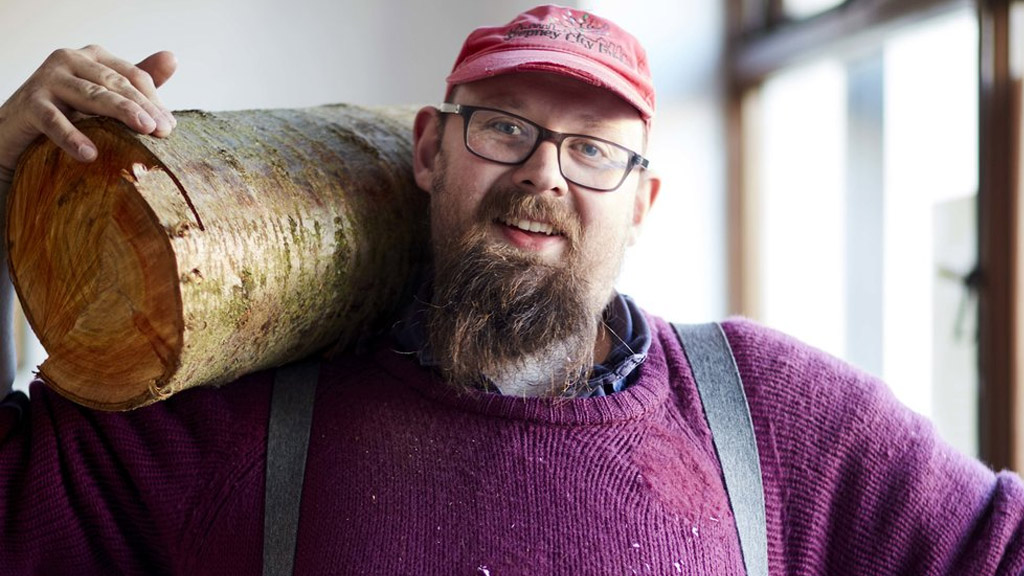Woodcarving is seeing a huge wave of interest at the moment, with many people turning to simple crafts during lockdown and sticking to them. Barn the Spoon, described by the Guardian as “London’s most famous and charismatic spoon whittler” will be coming down to teach a short course in spoon carving on 26 and 27 September, and Dartington Trust’s Will Kemp caught up with him to find out more about the man behind the legend.
Will: I think it might be good if we talked first about how you got into spoon making as your particular niche, because I imagine you’ve made all kinds of things, but then began to specialise…
Barn: I haven’t done very much joinery or cabinet making to be honest. I can make a little kind of dovetail box or something like that but I’ve never made a chest of drawers or a staircase or anything like that. I was initially obsessed with woodturning when I was a little kid. I had a lathe when I was 13 and used to do a lot with that. From there I moved towards more sculptural work and had a stint making wooden jewellery. I tried to set up a business making wooden jewellery and it completely failed. I basically ended up in a bedsit in Bristol with noisy dusty machines and I started getting breathing problems actually. So that pushed me towards green wood work, which I’d been introduced to a long time before but had not necessarily taken that seriously. So from there, I ended up doing an apprenticeship with Mike Abbott, learning his style of chair making, and that’s when I really got into spoons. You know, I’d made spoons before but that really got me going, you know, hanging out in the woods, learning a lot more about green wood from the trees surrounding us, using sharp edge tools, axes and knives, rather than things like fret saws and Dremel belt sanders.
Will: What makes the perfect spoon?
Barn: I suppose it’s about trying to find some form of aesthetic beauty born out of functionality, born out of something that works well. Not something that’s too fussy, that hasn’t taken too long. Understated, for me.
Will: Do you have a preference for any particular type of wood?
Barn: No. I guess I would tend to go for native hardwoods. So many of them a great! Really what matters is that it has been harvested sustainably, but so many different woods are great, whether it’s hornbeam, beech, hazel, hawthorn, alder, sycamore or maple, apple, cherry, any of them are great, and all completely different as well.
Will: Your course here at Dartington is called the Return of the Axe? Has the axe gone out of fashion and are you bringing it back into fashion?
Barn: I mean, it’s difficult from the inside. To me it feels like everyone’s carving spoons now, but obviously from the outside, it’s still a new thing. One of the things I passionately believe in is that we get closer to a more holistic approach to woodwork, what we would call the “new wood culture” or “wood culture renaissance”. I think, in this day and age, there’s actually quite an important voice there towards a way to live with trees and to sustainably live in our environment and to see it as a completely valid way for people to behave. You know, there should be more people living in the woods managing small woodlands on an individual scale, and providing a wonderful way of life for people through education and connection to nature. And that can live side by side with big industrial agricultural forestry methods, and it should live side by side with that because we can’t really exist now without our big machines and the internet.
Will: You mentioned about everyone doing spoons these days and I guess a lot more people than usual turned to wood carving and similar pastimes during the coronavirus lockdown. But how long does it take to really become a decent spoon maker?
Barn: Good question. I think that’s one of the things that’s really great about spoons. It’s one of these magic, simple crafts that you could learn to do in a day and make a perfectly functioning spoon. But then there’s so much scope. It’s as infinite as, you know, literature or music or anything else really. It’s just a three dimensional sculpture. I know a lot of woodworkers that do all sorts of things, whether it’s timber framing, cabinet-making, furniture–making, that are really into spoon carving and spoons is the one product that they keep coming back to throughout their life and people that have been doing it for 50 years, still chasing the perfect spoon, still loving it as an accessible quick product name to make, to play with. And that’s the thing that’s so strange about it. It’s not strange that people are doing it now. It’s strange that there was such a long period of time where there was no knowledge of how to do it. And obviously in the past, you know, the vast majority of us come from wood cultures of some kind, even coastal communities and within that, people have always come stones and they’ve always been a very important symbol of community of food of love. You know, that’s they’ve always been a big deal. So it’s extraordinary to me really, when I think about it, that they vanished and I think we’re just experiencing a kind of Jurassic Park moment really, there‘s just a handful of people doing it and the Internet has really let it explode, and I expect it to be exactly like yoga or the acoustic guitar because it’s so accessible. It’s the kind of thing that really, really will take off from there. It’s not going to stop.
Barn is also giving a public talk Craft is like a Song on Saturday 26 September.

